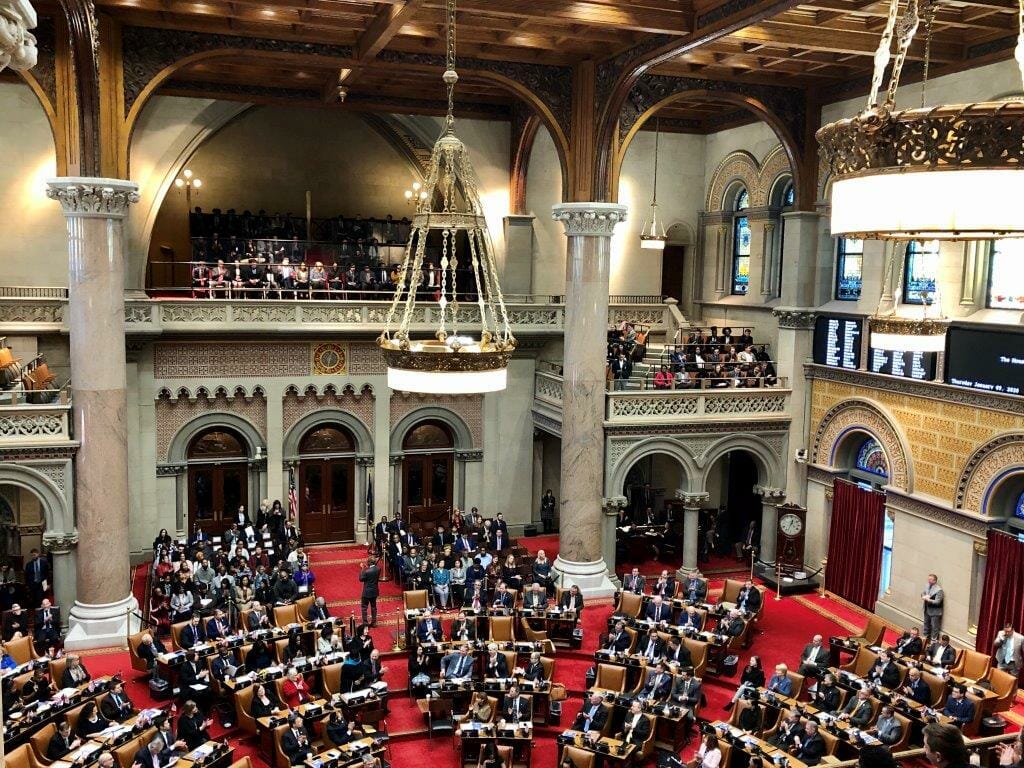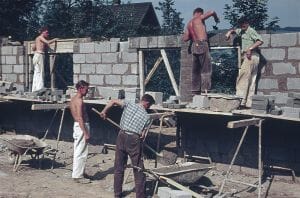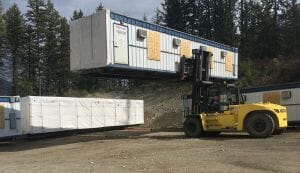Modular Building Institute Protects Members Doing Business in New York
Early during the 2020 New York State Legislature session, two companion bills—S5420 and A2933—were introduced. These bills would require the use of New York City union labor for all buildings built in the city and potentially the state, regardless of where the buildings were built or manufactured.
The Modular Building Institute (MBI) took immediate action as Government Affairs Director Jon Hannah and Executive Director Tom Hardiman began vetting potential lobbying firms to represent the industry in combatting these bills. The Carnelian Group, led by experienced lobbyist Claudia Granados, was retained and began working immediately with the bill sponsors and leadership to educate them on the modular industry and to ask for their assistance to withdraw or defeat these bills.
“In many cases, MBI devotes a lot of time an effort to kill legislation that would be harmful to the commercial modular construction industry”, said Hardiman. “We have to maintain a strong defense of our industry’s interests.”
As the COVID-19 pandemic began to take center stage in March for the legislature, Granados and MBI continued to work behind the scenes with the bill sponsors as well as House and Senate leadership to continue to express our concerns with these bills and the negative impact it would have on our industry and for New York City and the state.
“My approach,” said Granados, “was to focus on the positive impacts provided by the modular construction industry: cost savings, faster completion, environmental friendliness while delivering quality construction. Our goal was to position the MBI model as that of an industry disruptor for the greener and greater social good.”
With the legislative session scheduled to end in June, the legislature decided to return for a Special Session in August to address bills related to COVID19 as well as a cap of 100 additional bills. On August 18, New York City Mayor Bill de Blasio announced he was presenting a bill to the legislature that would force Project Labor Agreements (PLAs) which would require contractors working in the city to hire only certain restricted New York laborers for their work on any structure in the city. These agreements would have even stricter guidelines than the bills already presented.
Early during the 2020 New York State Legislature session, two companion bills—S5420 and A2933—were introduced. These bills would require the use of New York City union labor for all buildings built in the city and potentially the state, regardless of where the buildings were built or manufactured.

“My approach was to focus on the positive impacts provided by the modular construction industry: cost savings, faster completion, environmental friendliness while delivering quality construction. Our goal was to position the MBI model as that of an industry disruptor for the greener and greater social good.”
Claudia Granados, founder and lobbyist, The Carnelian Group
The Modular Building Institute (MBI) took immediate action as Government Affairs Director Jon Hannah and Executive Director Tom Hardiman began vetting potential lobbying firms to represent the industry in combatting these bills. The Carnelian Group, led by experienced lobbyist Claudia Granados, was retained and began working immediately with the bill sponsors and leadership to educate them on the modular industry and to ask for their assistance to withdraw or defeat these bills.
“In many cases, MBI devotes a lot of time an effort to kill legislation that would be harmful to the commercial modular construction industry”, said Hardiman. “We have to maintain a strong defense of our industry’s interests.”
As the COVID-19 pandemic began to take center stage in March for the legislature, Granados and MBI continued to work behind the scenes with the bill sponsors as well as House and Senate leadership to continue to express our concerns with these bills and the negative impact it would have on our industry and for New York City and the state.
“My approach,” said Granados, “was to focus on the positive impacts provided by the modular construction industry: cost savings, faster completion, environmental friendliness while delivering quality construction. Our goal was to position the MBI model as that of an industry disruptor for the greener and greater social good.”
With the legislative session scheduled to end in June, the legislature decided to return for a Special Session in August to address bills related to COVID19 as well as a cap of 100 additional bills. On August 18, New York City Mayor Bill de Blasio announced he was presenting a bill to the legislature that would force Project Labor Agreements (PLAs) which would require contractors working in the city to hire only certain restricted New York laborers for their work on any structure in the city. These agreements would have even stricter guidelines than the bills already presented.
“Our mission was to raise our issues to the key stake holders so that the Modular Building Institute is seen as a value-added partner of choice and thought leader when policies are being crafted,” said Granados. “I leveraged my robust network and deep expertise to be a steady and strategic leader striving to create a fairer environment and opportunities for MBI members to do business.”
MBI began working to defeat the PLA proposal as well as the companion bills and through numerous conversations with committee leadership as well as House and Senate leadership. As a result of these efforts, as well as numerous meetings with the Legislature’s staff itself, we were able to keep all these bills from coming to a vote during the 2020 session.
Even though the special session is ongoing, they are expected to only work on COVID-19 relief bills and social injustice bills. MBI continues to monitor the topics being discussed and will take additional action during this session if needed.
Had any of these bills passed and become law, MBI members would have likely been left out of numerous projects in the City. Additionally, these potential new requirements would have been accompanied by more oversight and more penalties for non-compliance if the new requirements weren’t followed to the letter of the law.
After the elections in November, we are scheduled to speak with our lobbyist to prepare for the 2021 session to create and implement a proactive plan to fight against bills like these that would prevent industry growth and cause financial harm and likely increase production time for the modular industry.
“In terms of future engagement with elected officials,” said Granados, “we want MBI to be known as an organization that cares about enhancing the community and providing excellent customer experiences and value in the NY market.”
“Our mission was to raise our issues to the key stake holders so that the Modular Building Institute is seen as a value-added partner of choice and thought leader when policies are being crafted,” said Granados. “I leveraged my robust network and deep expertise to be a steady and strategic leader striving to create a fairer environment and opportunities for MBI members to do business.”
This article was first published in the Modular Advantage - November/December 2020 Edition.
Additional Government Affairs Articles
What is the Davis-Bacon Act and How Does it Affect Modular Construction?
Adopted in 1941, the Davis-Bacon Act was written long before the modular construction industry gained momentum. Now, the US Dept. of Labor is considering applying the law in ways that will seriously curtail the use of modular construction for federal and state projects.
Read Complete ArticleMBI Solves Relocatable Building Code Issues in Atlanta
A large fleet owner member of MBI was recently delayed in Georgia due to the state’s confusion over the details of the International Building Code. According to the company’s regional general manager, “The feedback we got was, ‘Your plans are not up to date, you need to bring them up to code.’”
Here’s how MBI was able to correct the state’s misunderstanding.
Read Complete ArticleMBI Helps Kick-Start Stalled Plan Review Process
Modular projects in Washington State had ground to a halt. Plan review lead times began stretching into six, eight, even twelve weeks. “Over the summer of 2021, it was getting even longer than that,” says Alan Rasmussen of Modern Building Systems. “By the fall and winter of 2021, reviews were taking 24 weeks.”
Here’s how MBI was able to get things moving again.
Read Complete ArticleCalifornia Governor’s Office Working with MBI on Shipping Container Initiative for Homeless
California Governor’s Office Working with MBI on Shipping Container Initiative for Homeless MBI Government Affairs Director, Jon Hannah-Spacagna, was contacted…
Read Complete Article


